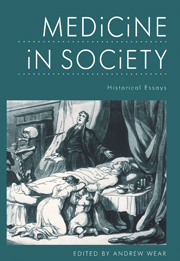Book contents
- Frontmatter
- Contents
- List of contributors
- Introduction
- Healers in the medical market place towards a social history of Graeco-Roman medicine
- Medicine and society in medieval Europe, 500-1500
- The patient in England, c. 1660–c. 1800
- Making sense of health and the environment in early modern England
- Medicine in the age of Enlightenment
- The rise of the modern hospital in Britain
- Medical practitioners 1750–1850 and the period of medical reform in Britain
- Public health, preventive medicine and professionalization: England and America in the nineteenth century
- Madness and its institutions
- From infectious to chronic diseases: changing patterns of sickness in the nineteenth and twentieth centuries
- Providers, ‘consumers’, the state and the delivery of health-care services in twentieth-century Britain
- The implications of increased life expectancy for family and social life
- Index
Making sense of health and the environment in early modern England
Published online by Cambridge University Press: 13 January 2010
- Frontmatter
- Contents
- List of contributors
- Introduction
- Healers in the medical market place towards a social history of Graeco-Roman medicine
- Medicine and society in medieval Europe, 500-1500
- The patient in England, c. 1660–c. 1800
- Making sense of health and the environment in early modern England
- Medicine in the age of Enlightenment
- The rise of the modern hospital in Britain
- Medical practitioners 1750–1850 and the period of medical reform in Britain
- Public health, preventive medicine and professionalization: England and America in the nineteenth century
- Madness and its institutions
- From infectious to chronic diseases: changing patterns of sickness in the nineteenth and twentieth centuries
- Providers, ‘consumers’, the state and the delivery of health-care services in twentieth-century Britain
- The implications of increased life expectancy for family and social life
- Index
Summary
Meanings of health and illness
Most of the chapters in this volume concentrate on medicine, its theories, organization, relations with the state and its general place in society. It is clear from them that ‘ medicine ’ has to be taken in a very wide sense, and its history is not just that of a limited, elite group of practitioners but encompasses many other groups in society (for instance the patients of the previous chapter). What is also obvious is that the ways in which health and illness were made sense of extend well beyond any single account of the theories of medical practitioners. In early modern England (1550-1750) some aspects of life which today are strongly ‘ medicalized ’ (under the control of doctors and medicine) were then less influenced by medicine, especially that of the elite or ‘ learned ’ medicine of the university-trained physicians. Childbirth and death were two such important events. Conversely, we might expect that the environment, the context in which all the stages of life took place, would not be related very closely to health in this period. After all, it was in the nineteenth century that the hygienic and sanitary revolutions took place, and it might seem that only in recent years has the environment been valued in its own right. However, in early modern England there were clear ways of making sense of the relationship between health and the environment. In this chapter I will first briefly sketch out an argument for putting the medical theories of this period into a social, economic and religious framework, and so lessening the sense that they are autonomous and separate from society.
- Type
- Chapter
- Information
- Medicine in SocietyHistorical Essays, pp. 119 - 148Publisher: Cambridge University PressPrint publication year: 1992
- 10
- Cited by



